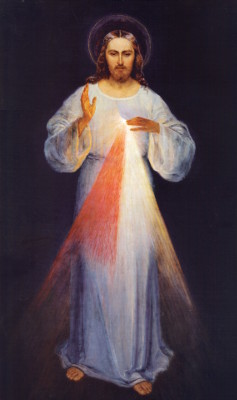

Divine Mercy Devotion
The Divine Mercy devotion had its beginning in the polish nun St. Faustina Kowalska. Jesus appeared to her in the early 1900s and gave her a message concerning His great mercy and asked her to spread devotion to His divine mercy. At the request of her confessor, St. Faustina wrote down her conversations with Jesus in a diary and this diary is the basis for much of the public divine mercy devotion in the Church today.
When Jesus appeared to her, He showed Himself in the famous divine mercy image. He has two rays coming from His heart; one is red and the other is white. They are symbols of the blood and water which flowed from the side of Jesus. The blood and water show that Jesus poured out His very life for the salvation of men. They demonstrate that Jesus gave everything of Himself. They are reminders of the mercy of God, and the graces which He wants to pour over us.
Jesus told St. Faustina that the 3pm hour was the hour of mercy. It is particularly advantageous to pray to God for mercy during that hour. It was at 3pm that Jesus died, so each day at that hour is a particular remembrance of Jesus' sacrifice and the graces which He won for us on the cross. By praying at that time and offering our prayers in union with Jesus' sacrifice, we recognize that all graces are gifts to us because of Jesus' death and that we need God's mercy in order to gain grace and do good.
Jesus also asked that a feast day be instituted each year to remember and particularly implore for Divine Mercy. Pope John Paul II was a great advocate of St. Faustina and her message. As pope, he instituted the feast of the Divine Mercy on the Sunday after Easter. This is a fitting day for it because it is shortly after the death and resurrection of Jesus which was when the divine mercy of God was most on display. Jesus told St. Faustina that anyone who went to confession and received Holy Communion on the feast day of the Divine Mercy would be forgiven of their sins and their punishment. In recognition of this, Pope John Paul II proclaimed a plenary indulgence for any who would pray, in a church prayers and devotions to the Divine Mercy on the feast of the divine mercy. This great gift of grace demonstrates God's willingness and desire to impart His graces and mercy to us; we only need to ask.
One of the other revelations of Jesus is the divine mercy chaplet. This is a prayer based on the rosary beads. It begins with an Our Father, Hail Mary and the Apostles Creed. Then, on each large bead, the following prayer is said: “Eternal Father, I offer you the body, blood, soul and divinity of your dearly beloved son, our Lord, Jesus Christ; In atonement for our sins and those of the whole world.” On each small bead, the following prayer is said: “For the sake of His sorrowful passion; Have mercy on us and on the whole world.” This chaplet only takes about five minutes to pray, so it can be said when there is not much time but you still want to pray and ask for God's mercy. It would be particularly fitting to pray it at 3pm every day.
In relation to the divine mercy chaplet, Jesus asked that a novena be prayed starting on Good Friday. This novena ends the day before Divine Mercy Sunday. On each day, a particular intention is prayed for, as requested b Jesus, and then the Divine Mercy chaplet is prayed. The intentions for each day are as follows:
Day 1: All mankind, especially sinners
Day 2: Souls of priests and religious
Day 3: Devout and faithful souls
Day 4: Those who do not believe in Jesus or who do not know Him
Day 5: Souls of separated brethren
Day 6: Meek and humble souls and the souls of children
Day 7: Souls who especially venerate God's mercy
Day 8: Souls in Purgatory
Day 9: Lukewarm souls
There is a novena prayer for each day, asking God's mercy on each of these groups. This is one of the best ways to remember to ask God for mercy. It is a great lead-in to Divine Mercy Sunday and also ties in beautifully with Good Friday, which is the ultimate expression of God's mercy.
